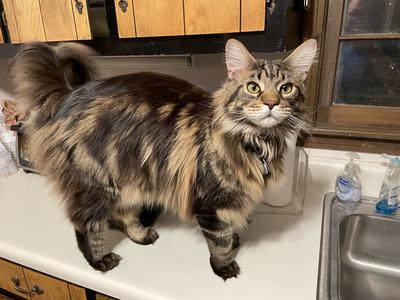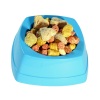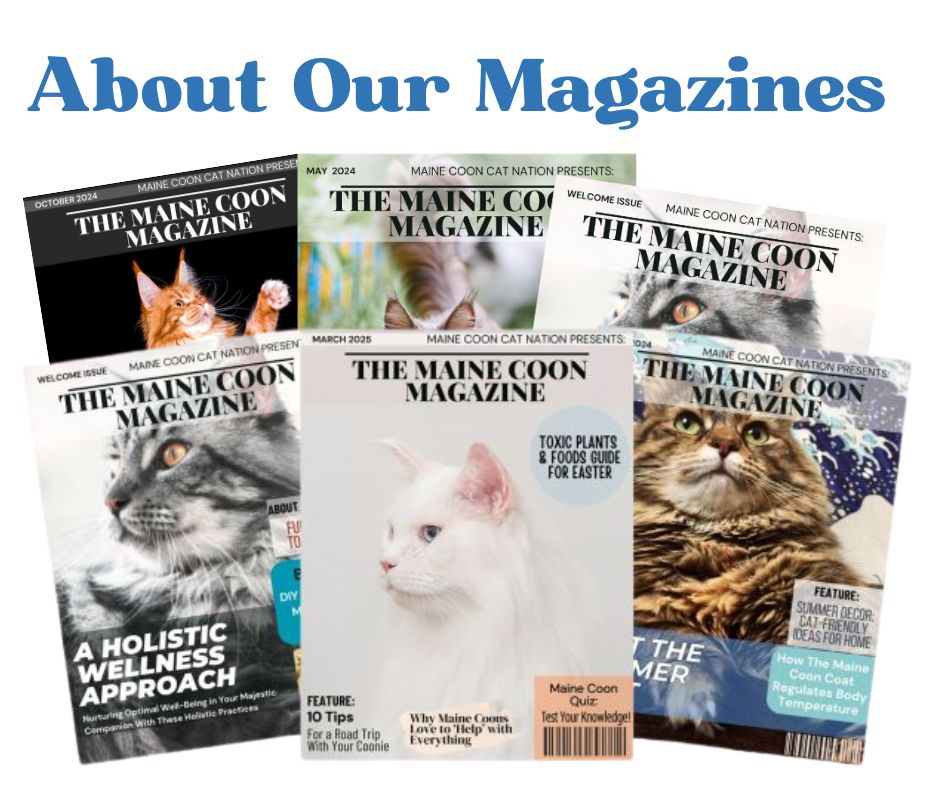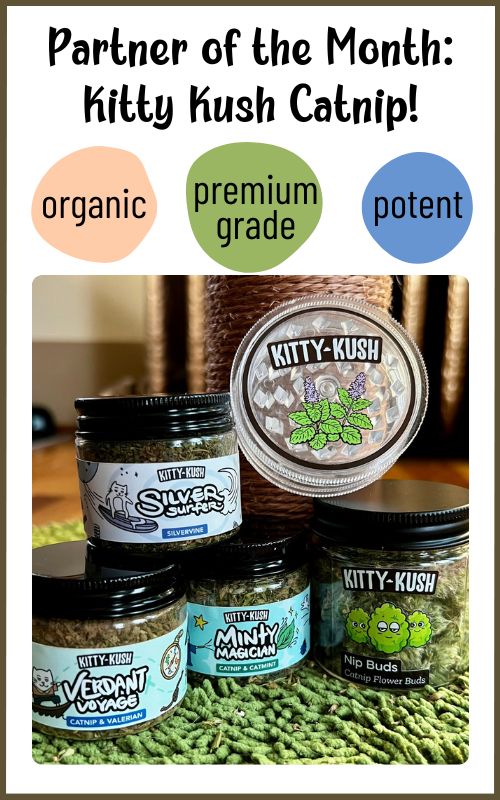- Home
- Maine Coon Food
- Wet vs Dry Cat Food
Disclosure: this site is reader-supported. When you buy through links on our site, we may earn a small commission, at no extra cost to you.
Wet vs Dry Cat Food for Maine Coons
Regarding wet vs dry cat food for Maine Coons, Nelson in Nashville asks: "Is wet food always preferable to kibble? There's a vet on YT who insists "the worst canned food is still better than the best kibble."
He reasons that the process of superheating products to create kibble depletes its nutrients. Is this true?
 Tintin
TintinAlso, our MC is 15 months. Fussy eater. We still have him on kitten food but he doesn't want the "pricey" ones.
His favorite is actually Iams. I feel guilty because it's a "cheap" food, but otherwise he won't eat and gets aggressive when hungry.
I also sprinkle some freeze dried chicken on top. I've probably given him too many "treats" (puree, cat sushi); my wife says that spoiled him to his normal food. Any thoughts?"
Reply:
Hi Nelson, This is a great question. The wet vs dry cat food debate has been going on for as long as there have been options.
Most cat owners end up doing what you are doing, which is feeding their furry friend whatever they will eat! After all, felines are notoriously picky eaters.
With that said, lets take a look at the options and their nutritional content. A cat's diet is the "key ingredient" to a long and happy life!
Dry pet food is made by combining wet and dry ingredients into a dough. The dough is then put into a machine called an extruder.
The extruder cooks the dough under pressure, then the dough is pressed by a die plate as it exits the extruder under pressure.
It comes out in ribbons which are sliced to make shapes. The kibble is then air dried in an oven to remove as much moisture as possible, and baked.
The final step is the application of a kibble coating. This kibble coating is a mix of flavors to enhance taste, and preservatives to extend shelf life.
So just because a Maine Coon loves a particular dry kibble doesn't necessarily mean he or she instinctively is drawn to a food that's wholesome or nutritious. It more likely means that the manufacturer has developed a recipe for a delicious coating.
Dry food diet related health problems:
Obesity and weight gain: Due to it's low moisture content, dry food is calorie dense. So a belly full of dry food means more calories than a belly full or wet food.
Urinary tract infections and kidney disease: Kitties on a dry diets often don't consume enough water. Being properly hydrated is essential for warding off urinary tract problems and for proper kidney function.
Diabetes: Dry kibble has an unnaturally high carbohydrate content. The carbs, when digested, break down into sugars in the body.
This excess of sugar is a leading cause of diabetes in cats. It's important to note that some canned (wet) cat foods can also have a carb content that is too high. It's recommended to aim for a 6% or lower carb content for folks who do feed dry kibble.
As for the claim that dry food cooks the nutrients out, that certainly is based in fact.
All food, whether it's pet food or human food experiences a change in composition when cooked.
Many studies have shown, and it's generally accepted as fact that the cooking and processing of dry pet food depletes it's vitamin, mineral and nutrient content. These are added back into the food via supplements.
For these reasons, many cat parents opt for canned cat food or even a raw diet like Stella & Chewey's raw blend. Raw food is a newer alternative and considered the best option by many.
When I was a kid, we always had cats and I was raised to think that canned wet food (or puree) was a treat, akin to dessert - and that dry kibble was their "real food."
That is certainly not the case! With it's high moisture content and fewer calories, this type of food is a solid choice.

Every family is different, and pet parents make the best decision that they can.
There are Maine Coon families who successfully feed raw diets, canned/wet, and dry kibble - all with healthy and happy Coonies.
As long as your vet approves and your Maine Coon is healthy, rest assured you're on the right track. Also, don't be afraid to offer new foods, especially raw and wet foods, on a regular basis!
An Only Wet Food Diet?
Feeding your cat only wet food generally poses no inherent health risks as long as it's nutritionally complete and balanced.
In fact, many cat owners and veterinarians prefer wet food due to its high moisture content, which supports kidney and urinary health, and because it more closely mimics the high-protein, low-carbohydrate diet cats would eat in the wild.
However, there are some factors to keep in mind to ensure balanced nutrition and long-term health.
1. Dental Health
Wet food alone doesn' t provide the abrasive action that dry kibble does, which may help with tartar control.
While diet alone isn't enough to fully protect dental health, combining wet food with dental treats, toys, and regular brushing can help keep their teeth clean and gums healthy.
2. Caloric Density
Wet food can be less calorie-dense than dry kibble, so it's important to ensure your cat is getting the right amount of food based on their size, age, and activity level.
Since wet food often has a higher water content, you may need to feed slightly more to meet their caloric needs, especially if your cat is particularly active.
3. Cost and Portion Control
Feeding only wet food can be more expensive and may require more careful portion control.
Wet food is typically portioned into smaller servings, which can make it easier to monitor how much your cat eats and manage their weight.
However, because it's more perishable, it needs to be properly stored in the refrigerator and used quickly to avoid spoilage.
4. Hydration Benefits
Wet food is often preferred for its hydration benefits. Cats can be prone to urinary and kidney issues, and the extra moisture in wet food can help mitigate this risk, especially if your cat doesn't drink a lot of water on their own.
This is especially helpful for male cats, who may be more susceptible to urinary blockages.
5. Digestive Health
Wet food may be easier for some cats, particularly seniors or those with dental issues, to digest. It’s also typically less processed than dry kibble, which some owners feel is a more natural diet for cats.
Feeding your cat only wet food can be a healthy choice with the right balance, but supplementing it with dental care and careful portioning will ensure it meets all of your cat's health needs.
I'm looking forward to hearing what our community has to say in the comments. What does your Maine Coon thrive on? ⬇️
Wet vs Dry Cat Food Comments:
Wet for my two boys!!
by: Amy
I have 2 male Maine Coons. One of them is prone to urinary blockages. I have had to have him unblocked 3 times.
They wanted him on special food but that wasn't an option. He has terrible allergies. I had him tested and he can only have turkey and duck.
Let's just say it isn't easy finding food without any chicken or fish. I found Merrick Limited Ingredient Turkey canned food. He loves it and we have been block free for about a year now.
My vet said neutered male cats are more prone to blockages. She said wet food is best! They do love dry kibble and I give that every once in a while as a treat.
Ivan
by: Norma
I have a beautiful giant 30 lb Maine Coon who was addicted to kibble. He suffered from a urinary blockage that almost killed him, and our vet put him on Urinary SO dry cat food.
For years he struggled with bouts of constipation and diarrhea until another major issue landed him in OSU Veterinary Hospital where he was fed only canned food for 5 days.
Since we brought him home 9 months ago, we have only given him canned food. He’s quite a large boy and he usually eats btw 3-4 cans a day.
It’s expensive but his digestive and bladder issues have disappeared. Since he’s on meds for his other issue we do also give him a probiotic.
I strongly recommend a canned food diet starting right from kittenhood as it would have saved him from a lot of pain and stress and saved us some major vet bills
Kibble Should Be Banned
by: Feline Parent
Why is kibble legal to be sold by manufacturer's knowing the damage it can cause animals up to and including death? I have been a cat owner my entire life.
Unaware of the dangers of kibble. Until we experienced it with our Addison. Yes, she's female. Don't be fooled thinking urinary issues can only happen to males (my sister lost 2 males due to blockages). We did not know our female was suffering until we found/noticed she was bleeding!
Thousands of $ in vet hospital bills later, and now for life on urinary tract food, we now have all 4 cats (1 female & 3 males) on canned food.
Hard to feed 1 cat urinary food & not the others so 1 of their 3 feedings of all canned include urinary canned food too (prevention).
Since we have followed this regimen, none including the males (which are more prone to urinary problems) have had any issues and are happy healthy cats.

Recent Articles
-
Today's Features
Apr 16, 25 09:54 PM
Today we have two classic Memory Lane pages to share!
Murphy & Candy Cane: Double the Maine Coon Charm - This adorable Maine Coon duo from our 2011 Photo Albums - Murphy and Candy Cane - brought doubl… -
Memory Lane Month Begins!
Apr 15, 25 10:22 PM
We're thrilled to start our "Memory Lane Month" event by visiting some cherished moments from our community! We're in the process of restoring meaningful community stories like this one, to preserve t… -
Will a Maine Coon Protect Its Owner From Danger or an Intruder?
Apr 09, 25 10:41 PM
Plenty of people are curious: Will a Maine Coon protect its owner if something happens? Let’s talk about what this means, and what kind of protector a Coonie is.



